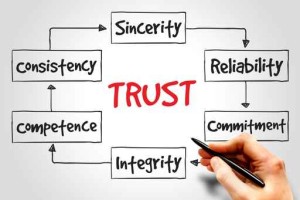Leadership & Character – Forgiveness

There are many ways to measure the degree to which a leader demonstrates positive character and my last blog reviewed the methodology Fred Kiel introduced in his book entitled “Return on Character”. In the book, character in leadership is based on an assessment of the presence of four universally accepted moral principles: integrity, responsibility, forgiveness and compassion.
Last time we explored responsibility. This time we will gain insight into the importance of forgiveness as it relates to character-based leadership. Forgiveness is a powerful characteristic to exhibit as a leader because it has the power to add tremendous strength to relationships. An important truth is that a leader’s success is profoundly influenced by the strength of the relationships. Read more




 The focus of today’s blog is the importance of caring to character-based leadership. There is an old quote by Theodore Roosevelt “Nobody cares how much you know, until they know how much you care.” It is widely accepted that business knowledge is a very important attribute of successful leaders. However, a leader’s business knowledge is only valuable if the leader is able to effectively communicate it so that it will influence the actions of others.
The focus of today’s blog is the importance of caring to character-based leadership. There is an old quote by Theodore Roosevelt “Nobody cares how much you know, until they know how much you care.” It is widely accepted that business knowledge is a very important attribute of successful leaders. However, a leader’s business knowledge is only valuable if the leader is able to effectively communicate it so that it will influence the actions of others. I have recently been doing some reading on the process people undergo in making decisions. I am fascinated by the number of factors that influence decisions and the impact of these factors. As one would expect, logic and reasoning (assessing the pros and cons), is an important element in the decision making process. What I found intriguing is that people can make decisions that – when objectively analyzed based on the data – are decisions that are difficult to rationalize. Factors such as emotion, pre-existing perceptions and trust play a large role in the decisions we make. Leaders must be aware of these factors and their impact on decisions. In this blog post, I am going to focus on the role of trust in decision making.
I have recently been doing some reading on the process people undergo in making decisions. I am fascinated by the number of factors that influence decisions and the impact of these factors. As one would expect, logic and reasoning (assessing the pros and cons), is an important element in the decision making process. What I found intriguing is that people can make decisions that – when objectively analyzed based on the data – are decisions that are difficult to rationalize. Factors such as emotion, pre-existing perceptions and trust play a large role in the decisions we make. Leaders must be aware of these factors and their impact on decisions. In this blog post, I am going to focus on the role of trust in decision making.  Identifying the traits, values and virtues that are present is a person of good character is a pursuit that has been going on for centuries. Aristotle identified twelve virtues that are present in someone of good character. As you might expect, the virtues are not mutually exclusive and can provide great insights to how good character impacts business leadership. For example, Aristotle included courage, practical wisdom and right ambition in his list of virtues. Many studies of leadership traits identify perseverance as an important trait that successful leaders possess. At the heart of perseverance is the concept of persistence. This is where character comes into play.
Identifying the traits, values and virtues that are present is a person of good character is a pursuit that has been going on for centuries. Aristotle identified twelve virtues that are present in someone of good character. As you might expect, the virtues are not mutually exclusive and can provide great insights to how good character impacts business leadership. For example, Aristotle included courage, practical wisdom and right ambition in his list of virtues. Many studies of leadership traits identify perseverance as an important trait that successful leaders possess. At the heart of perseverance is the concept of persistence. This is where character comes into play. Does your organization hire leaders who can manage with their head, heart and good character principles? When I was in university attending business school learning about how to make decisions and be an effective leader, we were taught the importance of assembling all of the relevant data, analyzing the data and then using logical reasoning to come up with the best plan of action. Much of what we learned was about how to use our head – or our cognitive intelligence (IQ) – to make good decisions.
Does your organization hire leaders who can manage with their head, heart and good character principles? When I was in university attending business school learning about how to make decisions and be an effective leader, we were taught the importance of assembling all of the relevant data, analyzing the data and then using logical reasoning to come up with the best plan of action. Much of what we learned was about how to use our head – or our cognitive intelligence (IQ) – to make good decisions.  Change is an everyday occurrence. You’ll find well-rounded leaders embracing change and having the ability to recognize the opportunities that change can bring and to “Realign Rigorously”. In order to do this, the leader needs to become a pro at innovation. And, that means never start with “it can’t be done.” What is needed, is the ability to create new mindsets, break the mold, think outside of the box and innovate. ‘Success comes in cans’ is a great play on words that contains profound truth.
Change is an everyday occurrence. You’ll find well-rounded leaders embracing change and having the ability to recognize the opportunities that change can bring and to “Realign Rigorously”. In order to do this, the leader needs to become a pro at innovation. And, that means never start with “it can’t be done.” What is needed, is the ability to create new mindsets, break the mold, think outside of the box and innovate. ‘Success comes in cans’ is a great play on words that contains profound truth. In their book “
In their book “